Since its founding in 1884, the Marine Biological Association has been home to many pioneering female scientists who have made groundbreaking contributions to the scientific community. The MBA takes great pride in its diverse team of female scientists, whose contributions continue to shape the future of marine research.
“I am thrilled to follow in the footsteps of our trailblazing female Research Fellows, the architects of tomorrow’s breakthroughs. Their vision and perseverance shatters barriers, and their passion inspires future generations. Leading an organisation with an inclusive culture, where women in science are integral to our success, is truly inspiring.” MBA Chief Executive, Professor Willie Wilson FMBA.
In honour of International Day of Women and Girls in Science, we’re proud to highlight some of the inspiring female Research Fellows here at the MBA.
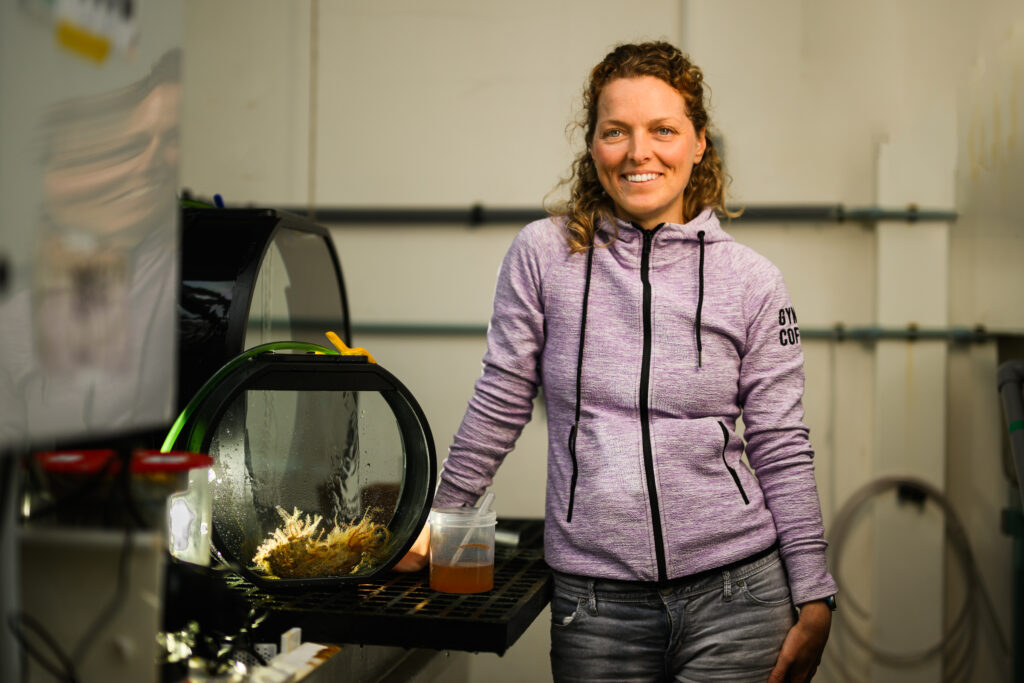
Dr Angela Stevenson
Dr. Angela Stevenson is a marine ecologist whose research focuses on benthic animals, particularly crinoids—feather stars and sea lilies. Through scientific diving, submersibles, and lab experiments, Angela explores their biology, ecology, and extraordinary regenerative abilities. Her research also explores their vulnerability to disease through the IUCN Marine Stars Specialist Group (MSSG). Angela’s research not only provides insights into evolution and biophysics but also bridges marine ecology with innovations in bio-inspired engineering.
Growing up along the St. Lawrence Estuary in Quebec, Canada, Angela developed a deep fascination with the natural world. “From a young age—even my kindergarten teacher could confirm—I was determined to become a naturalist, like Charles Darwin.” However, witnessing the degradation of the local ecosystem transformed her curiosity into urgency, motivating her to pursue marine science at the University of British Columbia. Becoming a certified diver allowed her to move beyond the water’s surface and immerse herself in the underwater world she had long admired.
You can read more about Angela’s journey into marine biology here.
Angela’s advice for females aspiring to enter marine biology:
“I am deeply committed to mentoring and supporting young female SCUBA divers and future scientific divers, equipping them with the skills and confidence to excel in a field that is still largely male-dominated. Scientific diving is exciting and fun, but it is also time consuming, physically and mentally demanding, and unfortunately, many environments are not always welcoming or safe for women. My advice to those entering the field is to seek mentors and institutions that foster respect and support, rather than ones that question your place in the field.
Curiosity, persistence, a strong sense of purpose, and hands-on experience are vital for women pursuing marine biology, particularly for research that requires scientific diving. The ocean holds countless mysteries, and to uncover them, you must follow your curiosity and intuition, not just the latest trends. If I had only chased the buzz of the moment, I might have never pursued my love for crinoids and discovered the exceptional properties that could revolutionise innovations. Marine science thrives on diverse perspectives, and your contributions are not only valuable—they are necessary.”
Follow Angela:
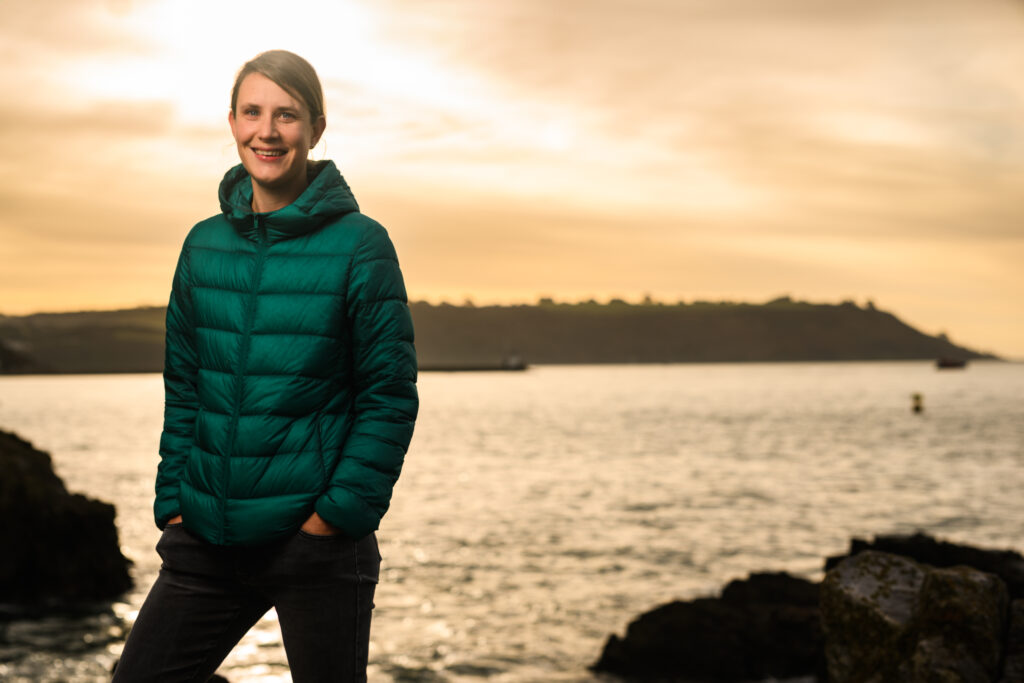
Dr Clare Ostle
Dr Clare Ostle is a marine biogeochemist and the coordinator of the Pacific Continuous Plankton Recorder (CPR) Survey. In addition to her leadership role with the CPR, she serves as the chair of the Global Alliance of CPR Surveys (GACS). Clare’s research focuses on understanding the long-term changes in marine ecosystems and plankton dynamics, the marine carbon cycle, and the impacts of plastic pollution in our ocean.
Her passion for the ocean was ignited at a young age, driven by an early fascination with marine life and a natural curiosity about the water. This enthusiasm led her to study a degree in marine biology at Swansea University. Clare later completed her PhD at the University of East Anglia, where she investigated how plankton activity and abundance may influence the variability of carbon dioxide flux in the North Atlantic. This work led to the development of a new method for estimating Net Community Production (NCP) using volunteer ships of opportunity and oxygen optodes, sparking her interest in enhancing instruments and sampling methods for the CPR.
Beyond her research, she has contributed to numerous synthesis reports and working groups, covering crucial topics such as ecological indicators for European marine policy, ocean warming, and ocean acidification.
Clare’s advice for females aspiring to enter marine biology:
“To women pursuing this field, I would encourage you to seek mentors that inspire you or with whom you feel a connection with, and for me, it feels important to stay true to yourself – you should not need to change who you are to succeed.”
Follow Clare:
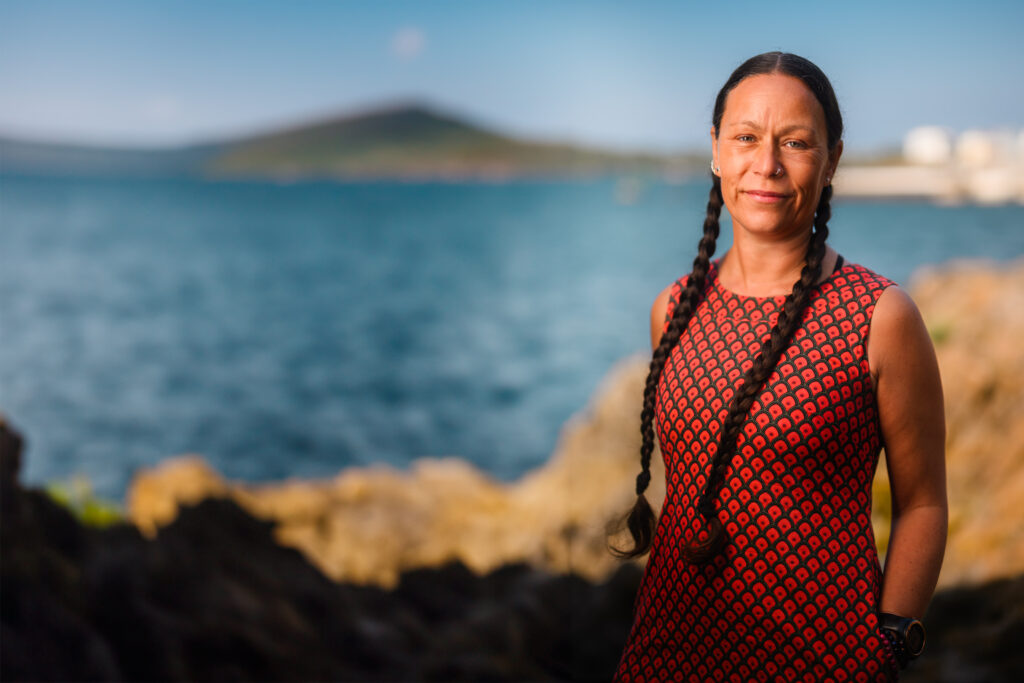
Dr Nova Mieszkowska
Dr Nova Mieszkowska is a leading marine biologist and ecologist with over 25 years of international research experience, having published more than 150 papers in in peer-reviewed scientific journals, statutory agency reports and assessments.
Nova leads the UK government-funded MarClim marine biodiversity and climate change project which monitors climate-driven shifts in coastal marine species across the Northeast Atlantic. MarClim has shown some of the fastest biogeographical shifts for species in any natural system, and its time-series data are now a cornerstone in global climate change research. Nova also leads the MBA’s involvement in the UK’s Darwin Tree of Life Project, producing genome assemblies for marine species in Britain and Ireland.
Her integrated research programme spans omics to examining how marine species are responding to climate change, ocean acidification, and multiple environmental stressors – combining both field and laboratory experimental research with large-scale biogeographic studies. Nova’s work is crucial in shaping policies around marine conservation and climate change, contributing to key reports such as the Intergovernmental Panel on Climate Change (IPCC) Assessment Reports, and providing baseline data for the designation of new Marine Conservation Zones in the UK.
Nova wanted to be a marine biologist since the age of six, inspired by watching the adventures of Jacques Cousteau. After learning to scuba dive, she pursued her passion through an honours degree in Marine Biology at Stirling University, a masters degree in Oceanography at the University of Southampton, and a PhD in physiological responses to climate change in marine invertebrates at Plymouth University whilst working as a Research Assistant at the MBA. After a year-long postdoc in the USA, she returned to the MBA and was awarded a Fellowship, which she maintains to this day.
Nova’s advice for females aspiring to enter marine biology:
“Follow your dreams, study hard, work hard and smart, network as much as you can with people in the industry, and seize all good opportunities that are offered to you.”
Follow Nova:
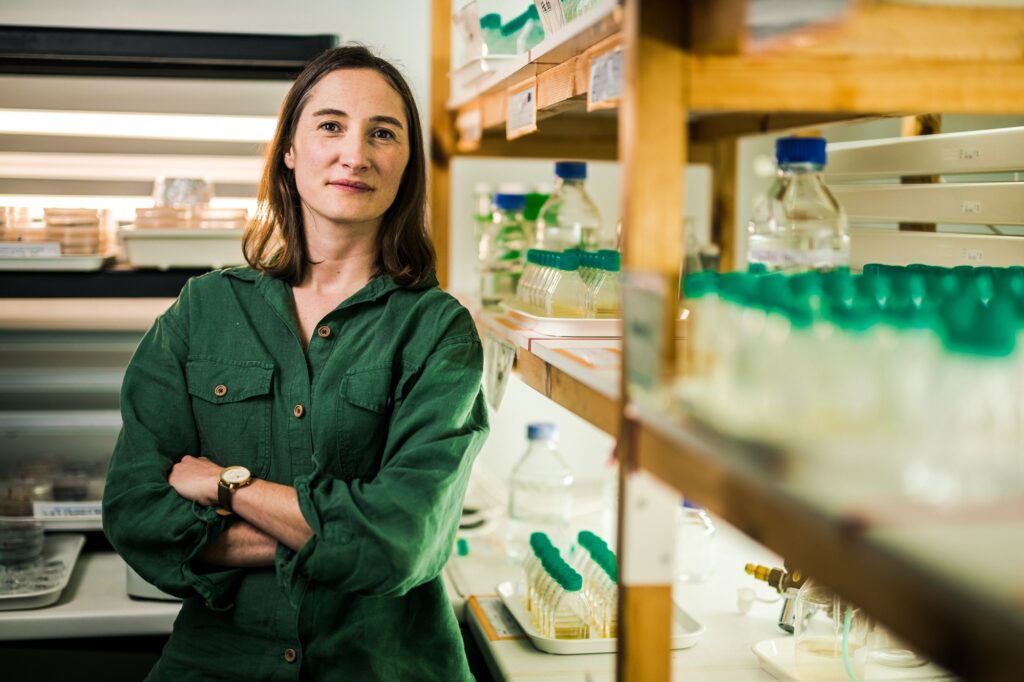
Dr Katherine Helliwell
Dr Katherine Helliwell is a NERC Independent Research Fellow, jointly appointed by the MBA and the University of Exeter in molecular microbiology. She leads on the Algal Microbiome and Ecophysiology group at the MBA. Her research combines novel molecular tools with environmental methods to investigate interactions of algae with other marine microbes, algal nutrient physiology and cell signalling mechanisms, with the aim to better understand how algae sense and respond to their environment.
Katherine has recently been awarded a prestigious European Research Council (ERC) Consolidator Grant for her DIACIDAL project, which will examine the interactions between phytoplankton and bacteria. The project aims to address crucial unknowns in our understanding of how certain bacteria can kill important phytoplankton known as diatoms – and how diatoms can sense and evade attack. The project has the potential to unlock opportunities for biotechnology, such as new antimicrobial compounds.
Her passion for biology has been lifelong, but it was during her undergraduate studies at the University of Bristol that she realised her true interest in Plant Sciences and studying photosynthetic organisms. She later pursued a PhD and postdoctoral research with Professor Alison Smith at the University of Cambridge’s Department of Plant Sciences, where she studied the role of vitamins in algal-bacteria interactions, contributing important insights into vitamin metabolism in aquatic microbes. Following a postdoc at the MBA with Professor Colin Brownlee on algal signaling mechanisms, she was awarded her NERC Independent Research Fellowship, which she continues to hold today.
Katherine’s advice for females aspiring to enter marine biology:
“There is so much to be done and discovered in this field, with many new tools and resources at our fingertips – the sky’s your limit! Find something that stimulates your interest, and people you enjoy working with and go for it! It is an exciting time to be a marine microbiologist. However, be sure to make room in your life for other things — that is also so important.”
Follow Katherine:
Read our latest news stories here!
- Urgent policy action needed to reverse decline in UK fisheries and protect coastal communities
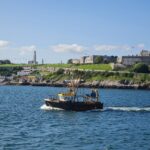 A major new study co-authored by the Marine Biological Association (MBA) has issued a stark warning that the UK is at serious risk of losing the wide-reaching benefits of its sustainable fisheries unless urgent action is taken. The paper, Recognising and Protecting the National Benefit of Sustainable Fisheries in the UK, highlights the deepening decline … Read more
A major new study co-authored by the Marine Biological Association (MBA) has issued a stark warning that the UK is at serious risk of losing the wide-reaching benefits of its sustainable fisheries unless urgent action is taken. The paper, Recognising and Protecting the National Benefit of Sustainable Fisheries in the UK, highlights the deepening decline … Read more - Global marine research boosted by MV Kaying’s role in Continuous Plankton Recorder Survey
 Plankton may be among the smallest creatures in the ocean, but their significance is anything but small. These microscopic organisms, from tiny fish larvae to single-celled algae, hold key insights into the health of our ocean and the broader impacts of climate change. Through the Continuous Plankton Recorder (CPR) Survey, a collaboration led by the … Read more
Plankton may be among the smallest creatures in the ocean, but their significance is anything but small. These microscopic organisms, from tiny fish larvae to single-celled algae, hold key insights into the health of our ocean and the broader impacts of climate change. Through the Continuous Plankton Recorder (CPR) Survey, a collaboration led by the … Read more - Ocean science meets innovation: Darite Marine Marvels win First Lego League competition
 The Marine Biological Association (MBA) plays a pivotal role in studying and protecting our ocean. Our innovative research, which includes tracking marine species and investigating the effects of climate change on marine life, is shaping our understanding of oceanography. This year, a group of talented students from Darite Primary Academy had the unique opportunity to … Read more
The Marine Biological Association (MBA) plays a pivotal role in studying and protecting our ocean. Our innovative research, which includes tracking marine species and investigating the effects of climate change on marine life, is shaping our understanding of oceanography. This year, a group of talented students from Darite Primary Academy had the unique opportunity to … Read more